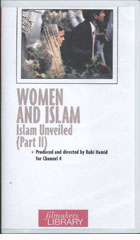
Women and Islam: Islam Unveiled 2004
Distributed by Filmakers Library, 124 East 40th Street, New York, NY 10016; 202-808-4980
Produced by Ruhi Hamid
Directed by Ruhi Hamid
VHS, color, 2 tapes, 48 min. each
Sr. High - Adult
Religious Studies, Sociology, Women's Studies, Middle Eastern Studies
Date Entered: 10/27/2006
Reviewed by Michael A. LaMagna, Reference Librarian, Cabrini College, Radnor, PAChallenging the Western view that Islam inherently represses women’s rights, journalist Samira Ahmed travels across the world examining Islamic customs as they relate to women. In this two part series Ahmed explores whether current Islamic customs such as polygamy, honor killings, requiring women to wear the hijāb (veil) is actually rooted in the Koran. Part 1 is dedicated entirely to the practice of women wearing hijābs and Part 2 examines how women are using the Koran to empower themselves against marriage and honor killing practices that are meant to control women’s behavior. The underlying theme throughout this documentary is the resistance of Muslims in any part of the world to what they believe is an intrusion of Western culture.
Part 1 explores why women choose or choose not to wear a hijāb. A hijāb is a veil used by Muslim women to cover their head and face. Ahmed begins by interviewing a group of Muslim university students in Britain who choose to wear a hijāb. Ahmed discusses with these women how her generation viewed the hijāb as a symbol of repression but for these Muslim university students and many other young British Muslims the hijāb is seen as a way to reject a Western culture that they feel is corrupting to their Islamic values. Ahmed then travels to Iran where women are forced to wear a hijāb. Many older women remember when wearing a hijāb was disapproved of by society, currently all women over the age of nine must be veiled. However, in Turkey women are required not to wear a hijāb in all public buildings including schools. This is because after World War II, Turkey embraced and continues to embrace Western culture. Again, like the students in Britain many younger women choose to wear a veil as a form or protest against Western culture.
In Part 2, Ahmed explores other Islamic practices that can be viewed as a means of controlling women’s behavior. In Egypt, the practice of female circumcision and premarital sexual relations are explored. In Pakistan, it is women’s property rights through marriage and issues relating to domestic violence. In Nigeria, the practice of polygamy is discussed. Women in each of these countries are using passages directly from the Koran to challenge these practices.
This is an exceptional documentary that provides a balanced examination of women and Islam. Ahmed challenges Western understanding of Islam by providing alternative perspectives to widely held Western assumptions. The audio and visual qualities are excellent. Conversations are translated into English and occasionally English subtitles are used. Women and Islam: Islam Unvieled is highly recommended for a variety of libraries.